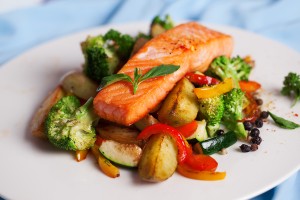Researchers from Loma Linda University followed 77,659 men and women who were from the Seventh-Day Adventist Churches for 7 years. This church group has been researched in the past as it is a cohesive cohort of non-smokers and non-drinkers. Many are also vegetarians, but not all. Food questionnaires were filled in regarding 200 food groups. During the follow-up period 490 cases of colorectal cancers were found. Of these 380 cases were colon cancers, 110 cases were rectal cancers. The researchers found that there were four subtypes of vegetarians: 1. pure vegans (only eating vegetables) 2. vegetarians who ate eggs and milk products 3. vegetarians who included fish in their diet and 4. Semi-vegetarians. The control group was the non-vegetarians.
Overall the risk of vegetarians to develop colorectal cancers was 22% lower than for non-vegetarians. Among those the risk for colon cancer was 19% lower and risk for rectal cancer was 29% lower than for non-vegetarians. How did the subtypes of vegetarian diets do with respect to colorectal cancer? Vegans’ risk for colorectal cancer was 16% lower when compared to non-vegetarians; the risk for egg and milk eating vegetarians was 18% less; fish eating vegetarians had 43% less colorectal cancer than non-vegetarians and semi-vegetarians had only 8% less.
The investigators pointed out that the fish eating vegetarians had the highest protection from colorectal cancer. Other risks for colorectal cancer include obesity, hypertension and diabetes.
Conclusion
A vegetarian diet with fish is a good type of diet. A Mediterranean diet including fish, but excluding sugar and starchy foods would also be a very recommendable diet. Molecularly distilled fish oil capsules, as a supplement is useful to prevent colorectal cancer as well. It is known from other literature that lycopenes in vegetables and salads and high fiber content contribute to the prevention of colorectal cancer. So, make sure you consume fish and vegetables and avoid other causes of colorectal disease like obesity, hypertension and diabetes.
More information about colon cancer screening: https://nethealthbook.com/cancer-overview/colon-cancer/colon-cancer-screening/
More info about risk factors for colorectal cancer: https://nethealthbook.com/cancer-overview/colon-cancer/food-risk-factors-colon-cancer-rectal-cancer/







